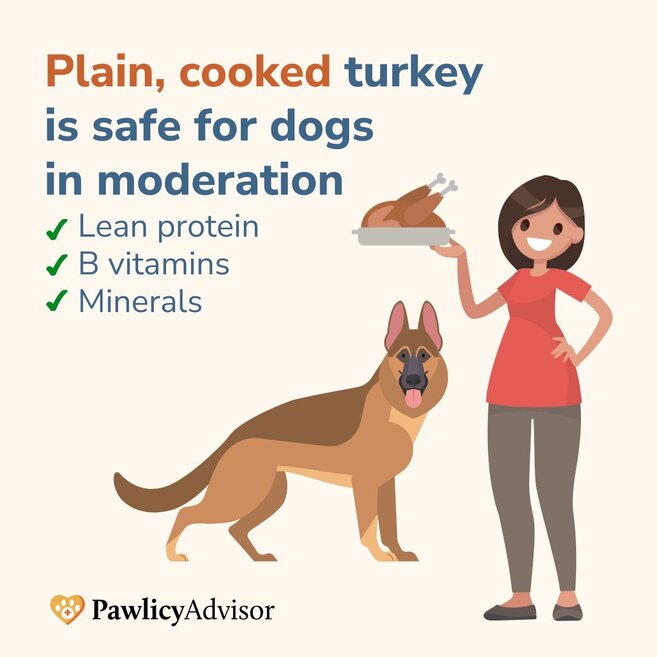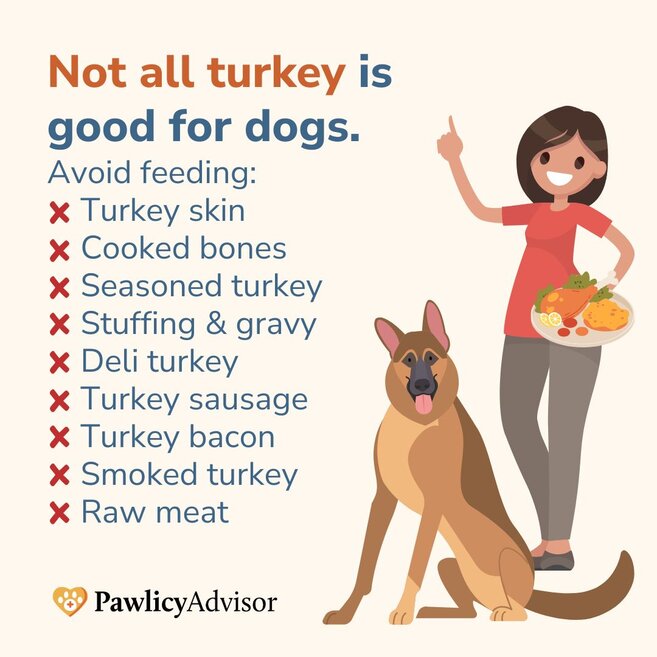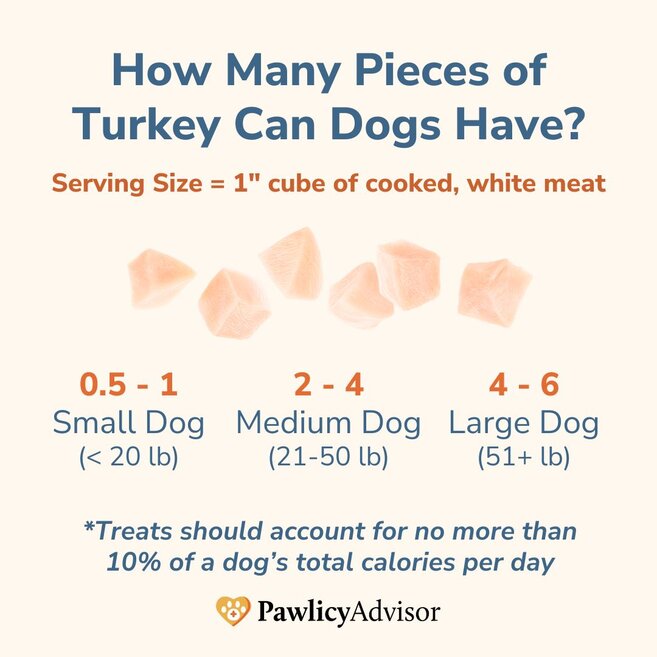Turkey For Dogs: A Holiday Treat or Hidden Danger?
The holiday season is approaching, and many will agree that the festivities are not marked complete without turkey. As the savory aroma fills the air, it's not just humans who are tempted by the feast; dogs also look forward to getting a taste.
But before you slip a piece of turkey to your furry friend, you might wonder, can dogs eat turkey? While turkey can be a healthy dog treat, here is what you need to know about sharing turkey with your dog this holiday season (and why having pet insurance is a worthy part of pet care.)
Your pet's health is priceless — let's protect it together.
Table of Contents:
- Is Turkey Safe for Dogs?
- Can Dogs Eat Ground Turkey?
- Can Dogs Eat Turkey Bones?
- Can Dogs Eat Turkey Necks?
- Can Dogs Eat Bacon or Turkey Sausage?
- Can Dogs Eat Turkey Lunch Meat or Smoked Turkey?
- What are the Nutritional Benefits of Turkey for Dogs?
- What Part of the Turkey Should Dogs Avoid?
- How Much Turkey Should You Feed Your Dog?
- What to do if your Dog Reacts to Turkey?
- Final Thoughts
Is Turkey Safe for Dogs?
Turkey is generally safe for dogs, but whether you should offer it to your dog depends on how it’s cooked. Turkey is often used in commercial dog food due to its high protein content and nutritional value, including B vitamins and minerals like phosphorus and riboflavin. However, the preparation during the holidays involves a lot of seasonings, oils, and other ingredients that can harm dogs.
So, if you intend to share this meat with your dog, take the following precautions:
- Remove the skin: Turkey's skin is high in fat and can cause pancreatitis in dogs.
- Avoid seasonings: Ingredients like onions, garlic, and spices can harm dogs.
- Feed only the meat: Ensure that no bones or fatty parts are included in the portion you give to your dog.

Can Dogs Eat Ground Turkey?
Yes, dogs can eat ground turkey, but ensure it's plain, unseasoned, and cooked thoroughly. While ground turkey is a great source of lean protein for your dog, avoid ground turkey that contains any added ingredients like garlic, onions, or seasonings, which can harm your dog.
Can Dogs Eat Turkey Bones?
Cooked turkey bones pose significant health risks to your dog. First, cooked poultry bones become brittle and can splinter easily, causing serious issues such as:
- Choking
- Mouth and throat injuries
- Intestinal blockages
- Piercing of the stomach or intestines
Raw bones may be a better option to feed your dog. Nonetheless, consult your vet before introducing raw bones into your dog's diet, as raw bones can still carry risks such as bacterial contamination.
Can Dogs Eat Turkey Bacon or Turkey Sausage?
Turkey bacon and turkey sausage are not safe for dogs. These processed meats often contain high amounts of sodium, preservatives, and other harmful ingredients, such as garlic and onion, that are toxic to dogs. Even if they are labeled healthier for humans, they are generally not recommended for dogs due to their additives.
Can Dogs Eat Turkey Necks?
Yes, dogs can eat turkey necks, but they must be careful with the preparation. Cooked turkey necks are a good source of protein and other nutrients; on the other hand, raw turkey necks should be avoided due to the risk of bacteria like salmonella, which can lead to food poisoning. Always cook the neck thoroughly before giving it to your dog.
Can Dogs Eat Turkey Lunch Meat or Smoked Turkey?
Deli turkey is also not advisable for dogs to eat. Deli meats are high in sodium and may contain nitrates, preservatives, and seasonings that can upset your dog's stomach and lead to long-term health issues like hypertension.
Avoid feeding your dog turkey lunch meat and smoked turkey. These processed forms of turkey contain high levels of sodium and preservatives, which can cause gastrointestinal upset and are unhealthy for dogs in the long run. Smoked meats, in particular, pose a risk due to the large amounts of sodium used in the smoking process.
What are the Nutritional Benefits of Turkey for Dogs?
When prepared safely, turkey can be a healthy treat for dogs. Turkey is rich in essential nutrients that support your dog's overall health, including:
- Protein
- B vitamins (B6, B12
- Zinc and Selenium
- Phosphorus

What Parts of the Turkey Should Dogs Avoid?
While plain turkey meat is safe, there are parts of the turkey that are dangerous for dogs:
- Turkey skin: High in fat and can lead to digestive issues.
- Cooked bones: Can splinter and cause choking or internal injuries.
- Fatty cuts of dark meat: High-fat content can upset your dog's stomach and lead to pancreatitis.
Seasoned or marinated turkey: Ingredients like garlic and onions are toxic to dogs.
How Much Turkey Should You Feed Your Dog?
If you choose to feed turkey to your dog, it should be in moderation and makeup only 10% of their diet, with the other 90% coming from well-balanced dog food. Here's a general guideline based on dog size:
- Small dog (under 20 lbs): ½ to 1 piece of turkey (1-inch cube)
- Medium dog (21-50 lbs): 2-4 pieces of turkey
- Large dog (51+ lbs): 4-6 pieces of turkey
Always consult your vet before adding new foods to your dog's diet, especially if your dog has health conditions like obesity or diabetes. Overfeeding turkey or any table scraps can lead to weight gain and digestive issues.

What To Do If Your Dog Reacts To Turkey
If your dog experiences any adverse reactions after eating turkey—such as vomiting, diarrhea, or signs of choking—it's crucial to act quickly. Contact your vet for immediate advice, especially if your dog has consumed turkey bones, fatty turkey skin, or seasoned meat. These items can cause serious health issues like pancreatitis, intestinal blockages, or worse.
Pet insurance can come in handy when these unforeseen issues arise. The costs associated with treating conditions like pancreatitis or surgery for intestinal blockages can be steep, but pet insurance helps alleviate some of that financial burden. Compare various providers and choose the best insurance company to protect your dog and provide peace of mind in case of emergencies.
Looking to save on vet bills? See which pet insurance is right for you.
Instant results. 1M+ pet parents served.
⭐⭐⭐⭐⭐ 4.9 stars across hundreds of reviews.
See which pet insurance is right for your best friend.
Final Thoughts
So, can dogs eat turkey? Yes, as long as it's plain, cooked, and free of harmful additives, turkey can be a healthy treat for your dog. However, processed forms like turkey bacon, sausage, and deli meats are best avoided. Always consult your veterinarian before introducing new foods into your dog's diet; remember, moderation is key. Most importantly, invest in pet insurance and sign up for our newsletter to get the latest tips and resources on pet care straight to your inbox.
Do you want to find the best pet insurance?
Let's analyze your pet's breed, age, and location to find the right coverage and the best savings. Ready?
Analyze My PetAbout Pawlicy Advisor
The pet insurance marketplace endorsed by veterinarians, at Pawlicy Advisor we make buying the best pet insurance easier. By comparing personalized coverage and pricing differences we can save you a ton of money, up to 83% in some instances!
Instantly Compare Pet Insurance Plans
Guides
Determine If Pet Insurance Is Worth It
Comparison Charts
Find Your State
Dog Insurance
DVM
Ricky Walther, DVM, is a small animal general practitioner in the greater Sacramento, California area. Realizing the positive financial and medical impact that pet insurance can provide for pet parents and the profession, he lends support and advice to companies like Pawlicy Advisor "The Pet Insurance Marketplace") that simplify the process of connecting with veterinary financing resources.
